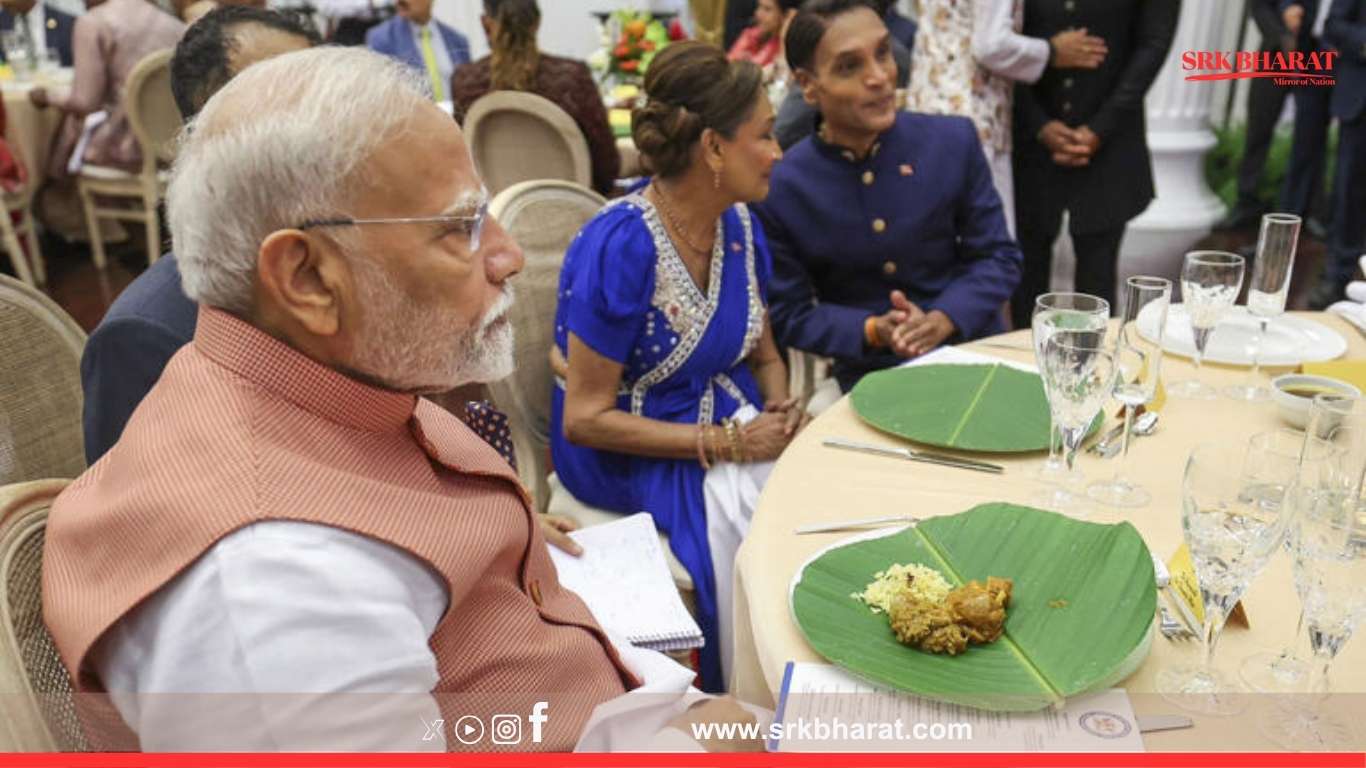In a moment reflecting cultural heritage and environmental consciousness, Prime Minister Narendra Modi was served food on a traditional Sohari leaf during a dinner hosted by Trinidad and Tobago’s Prime Minister Dr Keith Rowley on the sidelines of his diplomatic visit to the Caribbean nation. The use of Sohari leaf plates not only underscored local customs but also highlighted sustainable dining practices resonating with India’s own eco-friendly traditions.
Key Highlights
- PM Modi dined on traditional Sohari leaf plates in Port of Spain.
- The dinner was hosted by Trinidad and Tobago PM Dr Keith Rowley.
- The Sohari leaf holds cultural significance among Indo-Trinidadian communities.
- Modi appreciated the blend of tradition, hospitality, and sustainability.
- The dinner included authentic Indo-Caribbean cuisine and local delicacies.
What Is Sohari Leaf?
The Sohari leaf, derived from the teak family tree, is widely used across rural South Asia and Caribbean Indian diaspora communities as a natural biodegradable plate. It is known for:
- High durability even with liquid foods
- Eco-friendly disposal and compostability
- Cultural symbolism of purity and respect towards guests
The Dinner Menu
| Course | Dish |
|---|---|
| Starter | Pholourie with tamarind chutney |
| Main Course | Roti, curried goat, channa aloo, pumpkin talkari |
| Side | Mango kuchela, cucumber salad |
| Dessert | Cassava pone, gulab jamun |
| Beverage | Sorrel juice, coconut water |
Guests at the dinner, held at the Prime Minister’s official residence, were served dishes representative of Indo-Trinidadian culinary traditions that evolved from India’s Bhojpuri belt food culture.
Significance Of Sohari Leaf In Indo-Trinidadian Heritage
The Trinidadian Indian community, descendants of indentured labourers from Bihar and Uttar Pradesh between 1845-1917, continue using Sohari leaf plates for:
- Religious ceremonies (pujas, yajnas, Ramleela feasts).
- Community gatherings and traditional weddings.
- Symbolic offering to deities during temple functions.
Prime Minister Modi expressed delight at experiencing cultural continuities between India and its global diaspora. He reportedly remarked:
“Eating on Sohari leaf reminds me of my childhood in Gujarat where meals were often served on banana leaves or Sal leaves. It connects us back to nature and our roots.”
Diplomatic Outcomes Of The Visit
| Focus Area | Agreements Discussed |
|---|---|
| Renewable Energy | Solar energy collaboration under International Solar Alliance |
| Diaspora Relations | Cultural exchange programmes and skill development |
| Trade | Boosting bilateral trade in pharmaceuticals and agricultural products |
| Climate Action | Joint coastal resilience strategies |
The two leaders emphasised deepening cultural ties alongside strategic cooperation, acknowledging the Indian diaspora’s role in shaping Trinidad and Tobago’s pluralistic identity.
Environmental Message In Dining Tradition
Analysts observed that serving food on Sohari leaves also sent a subtle diplomatic message aligned with India’s global advocacy for:
- Sustainable living practices
- Reduction of plastic usage in food services
- Promotion of biodegradable alternatives under Swachh Bharat Abhiyan goals
Netizens React
Social media platforms were abuzz with reactions:
- @IndianDiasporaTnT: “Seeing PM Modi eat on Sohari leaf is heartwarming. Our culture travels beyond borders.”
- @GreenIndiaNow: “This is how world leaders should promote sustainable dining practices. Respect.”
The Role Of Indo-Trinidadian Community
With over 37% of Trinidad and Tobago’s population being of Indian descent, the community has preserved folk arts, Bhojpuri-origin vocabulary, classical music traditions like Chutney, and vegetarian culinary practices. Sohari leaf dining remains integral to their identity, merging eco-consciousness with spiritual tradition.
Experts’ Views
- Dr Ravi Maharaj, Caribbean cultural historian:
“Using Sohari leaf is not just nostalgia. It signifies resilience of indentured labourer traditions and their adaptation in the Caribbean.” - Prof. Aditi Sharma, Sustainable Dining Researcher:
“Global leaders embracing biodegradable dining can influence millions towards greener habits. Sohari leaf dining is zero waste.”
Broader India-Trinidad & Tobago Relations
| Parameter | Data |
|---|---|
| Diplomatic ties established | 1962 |
| Bilateral trade (2023) | USD 370 million |
| Indian diaspora population | ~550,000 |
| Key exports to Trinidad | Pharmaceuticals, machinery, textiles |
India and Trinidad share strong bonds through cultural diplomacy, with Bollywood, yoga, and classical dance widely popular in the Caribbean nation.
Future Initiatives Announced
During the visit, both leaders agreed to:
- Establish a Trinidad-India Centre for Diaspora Studies to document and promote Indo-Caribbean heritage globally.
- Launch joint scholarships for agricultural research focused on tropical crops resilience.
- Facilitate direct shipping lines to reduce trade timeframes by over 30%.
Conclusion
Prime Minister Modi’s dinner on Sohari leaf in Trinidad and Tobago was more than a diplomatic courtesy – it was a powerful symbol of cultural revivalism, environmental awareness, and historical acknowledgment. It underlined how traditional practices can gain modern relevance in fostering sustainability and cultural pride at the highest diplomatic platforms.
Disclaimer: This news article is for informational purposes only and does not constitute diplomatic policy advice. Readers are encouraged to follow official Ministry of External Affairs statements for confirmed visit outcomes and strategic agreements. The publication is not responsible for decisions made based on the information presented.











